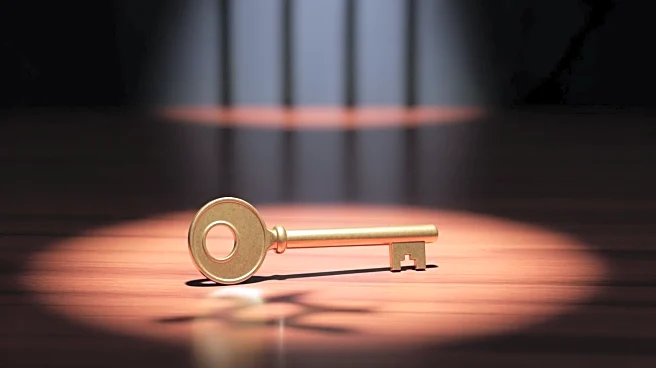What's Happening?
Former Congressman George Santos, who was recently released from federal prison following a presidential commutation by President Trump, has announced his intention to focus on prison reform. Santos, who served 84 days of an 87-month sentence for identity
theft and wire fraud, described his prison experience as 'humbling' and highlighted the poor conditions at FCI Fairton, a federal correctional facility in New Jersey. He spent a significant portion of his sentence in solitary confinement, which he described as 'dehumanizing.' Santos, who was expelled from Congress after a House Ethics Committee report accused him of various misconducts, including campaign finance violations, has expressed a desire to dedicate his life to improving the penal system.
Why It's Important?
Santos's commitment to prison reform could bring attention to the conditions within the U.S. penal system, potentially influencing public policy and reform efforts. His high-profile case and subsequent release by presidential commutation underscore ongoing debates about the fairness and effectiveness of the criminal justice system. Advocates for prison reform may find an ally in Santos, who has firsthand experience of the system's shortcomings. However, his controversial past and the circumstances of his release may also attract skepticism and criticism from those who question his motives and credibility.
What's Next?
Santos has expressed interest in working with President Trump's administration on prison reform initiatives. He has not ruled out a future run for office in New York, although he does not feel an immediate need to return to government service. Santos has also resumed activity on the video platform Cameo and is open to television opportunities, including potential participation in shows like 'Dancing with the Stars.' His future actions and involvement in prison reform efforts will be closely watched by both supporters and critics.
Beyond the Headlines
Santos's case highlights broader issues within the U.S. criminal justice system, including the use of solitary confinement and the treatment of inmates in protective custody. His experience may shed light on the need for reforms that address the mental and physical well-being of prisoners. Additionally, the political implications of his release by President Trump could influence future discussions on presidential pardons and commutations, particularly in cases involving political figures.















